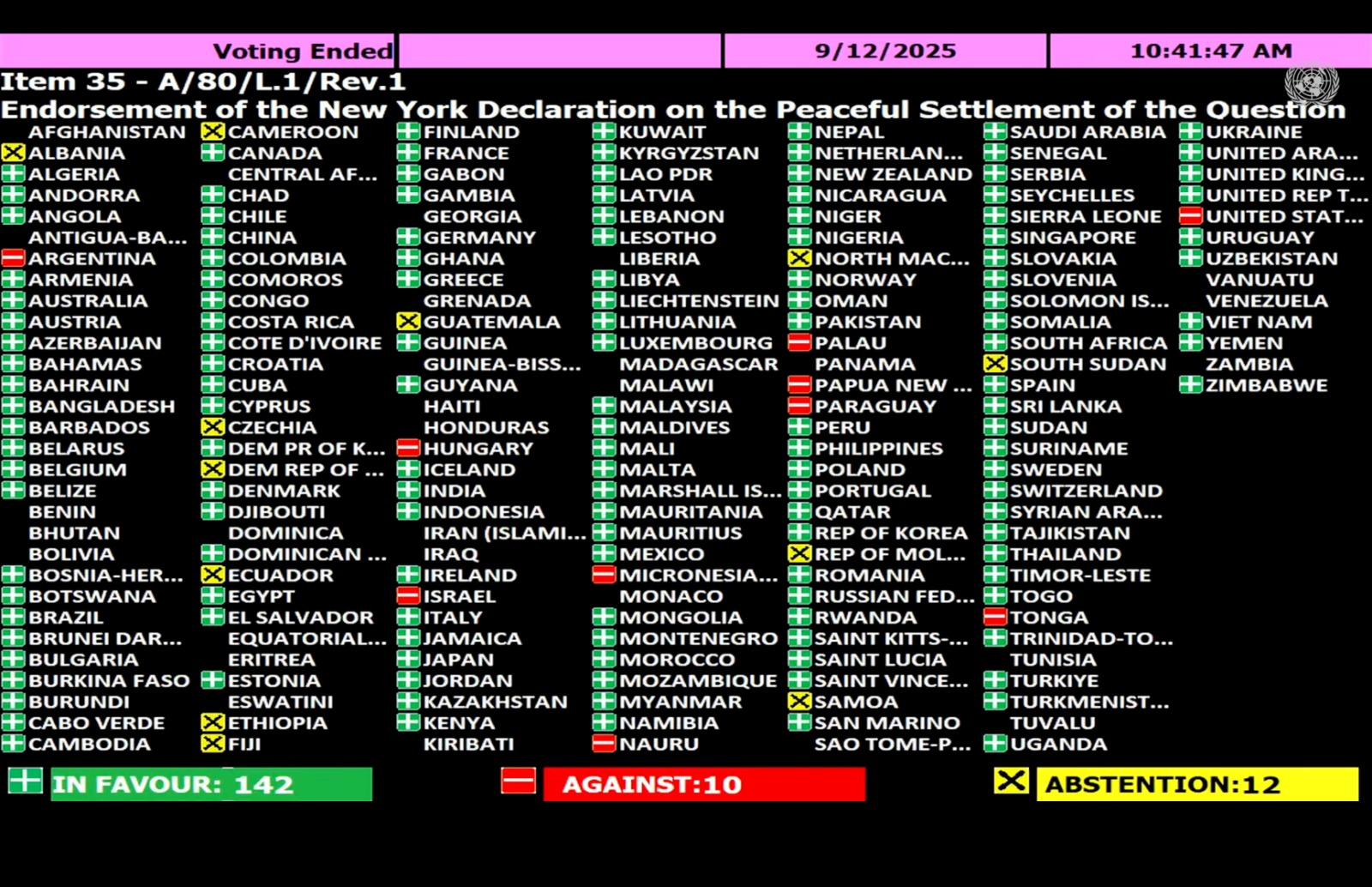UN General Assembly Endorses New York Declaration on Palestine
The UN General Assembly overwhelmingly endorsed the New York Declaration on September 12, 2025, backing a two-state solution and the establishment of an independent Palestinian state, despite opposition from Israel and the United States.

On September 12, 2025, the United Nations General Assembly voted decisively to endorse the New York Declaration, a resolution supporting the implementation of a two-state solution and the creation of an independent State of Palestine. The resolution, which emerged from a high-level international conference co-chaired by France and Saudi Arabia in July, received support from 142 countries, with 10 voting against and 12 abstaining. Applause broke out in the Assembly Hall as the measure passed, reflecting broad international backing for renewed efforts toward peace between Israel and Palestine.
Key Provisions and International Reactions
The New York Declaration lays out a comprehensive roadmap for peace, calling for an immediate ceasefire in Gaza, the release of all hostages, and the establishment of a viable, sovereign Palestinian state. It also demands the disarmament of Hamas and its exclusion from governance in Gaza, normalization of relations between Israel and Arab states, and collective security guarantees for both peoples. The resolution explicitly condemns the October 7, 2023, Hamas attack on southern Israel, as well as Israel's subsequent siege and military actions in Gaza, which have resulted in a severe humanitarian crisis. The document urges all UN member states to recognize Palestine, describing this as an "essential and indispensable component" of achieving a two-state solution.
The Palestinian Authority welcomed the resolution, with its Ministry of Foreign Affairs expressing gratitude to the countries that supported the measure and calling for its swift implementation. Palestinian UN Ambassador Riyad Mansour described the vote as a reflection of the international community's desire for peace and urged Israel to heed the call for a negotiated settlement.
Opposition and Criticism
Israel and the United States led opposition to the resolution, with Israeli Prime Minister Benjamin Netanyahu and UN Ambassador Danny Danon rejecting the declaration as "one-sided" and counterproductive. Danon argued that the measure would only benefit Hamas and undermine the Assembly's credibility. The U.S. Mission to the UN echoed this sentiment, labeling the resolution a "misguided and ill-timed publicity stunt" that could hinder genuine diplomatic efforts. Other countries voting against included Argentina, Hungary, and several Pacific island nations.
Despite the opposition, the resolution's passage marks a significant moment in the ongoing debate over the Israeli-Palestinian conflict. The declaration's call for a UN-backed mission to protect Palestinian civilians and oversee the transition of governance in Gaza underscores the international community's concern over the humanitarian situation and the need for a durable peace framework.
Next Steps and Broader Implications
The New York Declaration is nonbinding but carries substantial political weight as an official UN document. It calls on member states to pressure Israel to halt military operations, end the use of starvation as a weapon, stop forced displacement, and release prisoners and hostages. The resolution also urges the international community to use all available measures to end Israel's occupation and uphold Palestinian rights.
While the declaration does not guarantee immediate change on the ground, it signals a renewed global commitment to the two-state solution as the only viable path to peace. The coming weeks will test whether the broad support in the General Assembly can translate into concrete diplomatic and humanitarian progress amid ongoing violence and deep-seated mistrust.